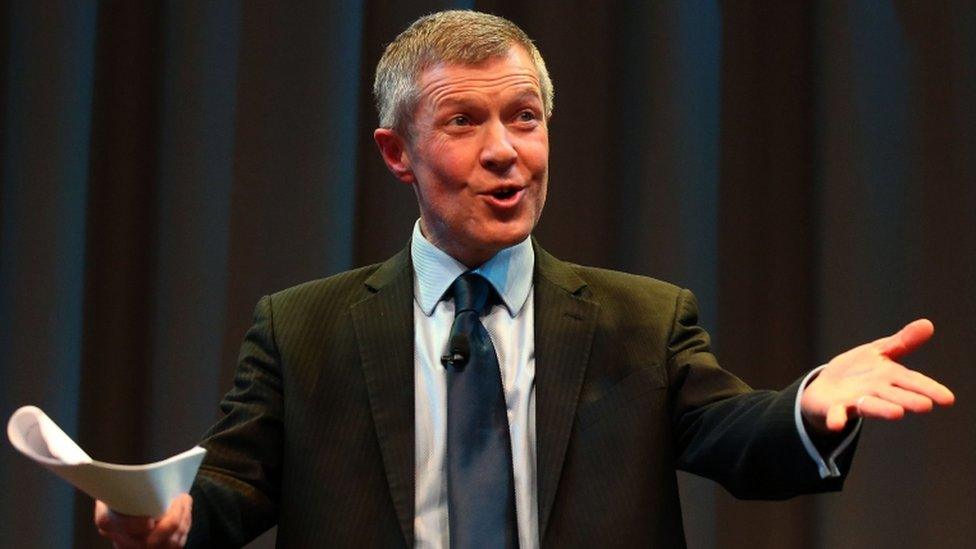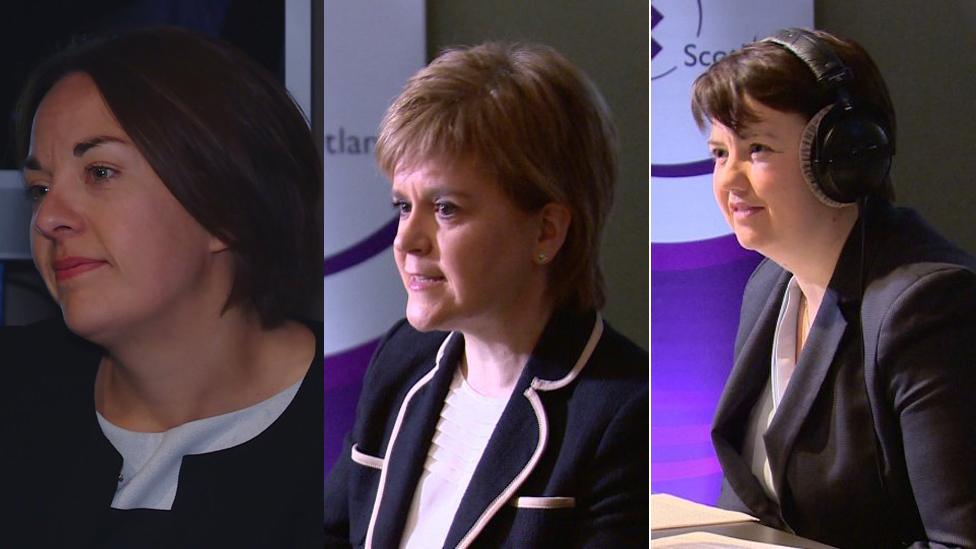Rennie predicts 'rosy future' for Lib Dems
- Published

Willie Rennie's party fell behind the Scottish Greens after winning five seats in last year's Holyrood election
The leader of the Scottish Liberal Democrats has insisted that "things are looking rosy" for his party ahead of May's council elections.
The Lib Dems lost 95 seats in the last local authority vote in 2012, and won just five seats in last year's Holyrood ballot.
But Willie Rennie said his party had "turned the corner" because it supports remaining in both the UK and the EU.
He pointed to a "stonking big result" in a Highland by-election, external as evidence.
Mr Rennie was speaking to the BBC's Good Morning Scotland programme in the latest of its series of interviews with the leaders of Scotland's largest political parties.
He predicted his party would "grow" in the local government election, but declined to say what targets had been set.
Mr Rennie added: "We have not only been gaining thousands of members, but we have also been winning council by-elections right across the country.
"A stonking big result in Inverness just recently where we won, we had that Richmond by-election that we won, we have got some really good momentum behind us now and I am really positive about our chances."
Mr Rennie said his party had a "great offer" on "making Scotland fair and decent and open and outward-looking".
'Thinking carefully'
He said: "We are on the up, we have turned the corner, things are looking rosy for the Liberal Democrats. And the reason why is because we are unique in Scottish politics.
"We are in favour of the United Kingdom, strongly against independence. We are in favour of the European Union, and we are also progressive."
He also repeated his party's call for a referendum to be held on any Brexit deal before the UK leaves the EU because "we need to be thinking carefully about the consequences for security, for universities, for our economy".

Good Morning Scotland has also interviewed Kezia Dugdale, Nicola Sturgeon and Ruth Davidson over the past week
And he said he could not choose between whether it was more important for Scotland to be a member of the UK or of the EU.
He added: "I actually think we should be aiming high, aiming for both of them, because they are both important to us."
In previous interviews with the programme, First Minister Nicola Sturgeon suggested that a so-called soft Brexit - where the UK retains membership of the European single market - would see the prospect of Scottish independence removed in the short term.
Ms Sturgeon added: "We've put forward very detailed plans about how we avoid a hard Brexit and the reason it's important to avoid a hard Brexit, let's not forget, is because that will have a devastating impact on our economy and on jobs.
"So I'm in a sense willing to put aside my preferred option of independence in the EU to see if we can explore a consensus and compromise option."
'Blind faith'
Meanwhile, Scottish Conservative leader Ruth Davidson said she wanted the UK to have the "largest amount of access" to the single market after Brexit.
Ms Davidson argued that free trade was more important to the country than cutting immigration.
But Scottish Labour leader Kezia Dugdale told the programme that "good faith is fast becoming blind faith" over the first minister's plans.
She said she "absolutely" supported Scotland's "ability to have access to the single market", but argued that Ms Sturgeon had failed to produce "real evidence" of how this could happen if the rest of the UK leaves.
Good Morning Scotland is due to interview the co-convenor of the Scottish Greens, Patrick Harvie, at about 07:15 on Thursday morning.